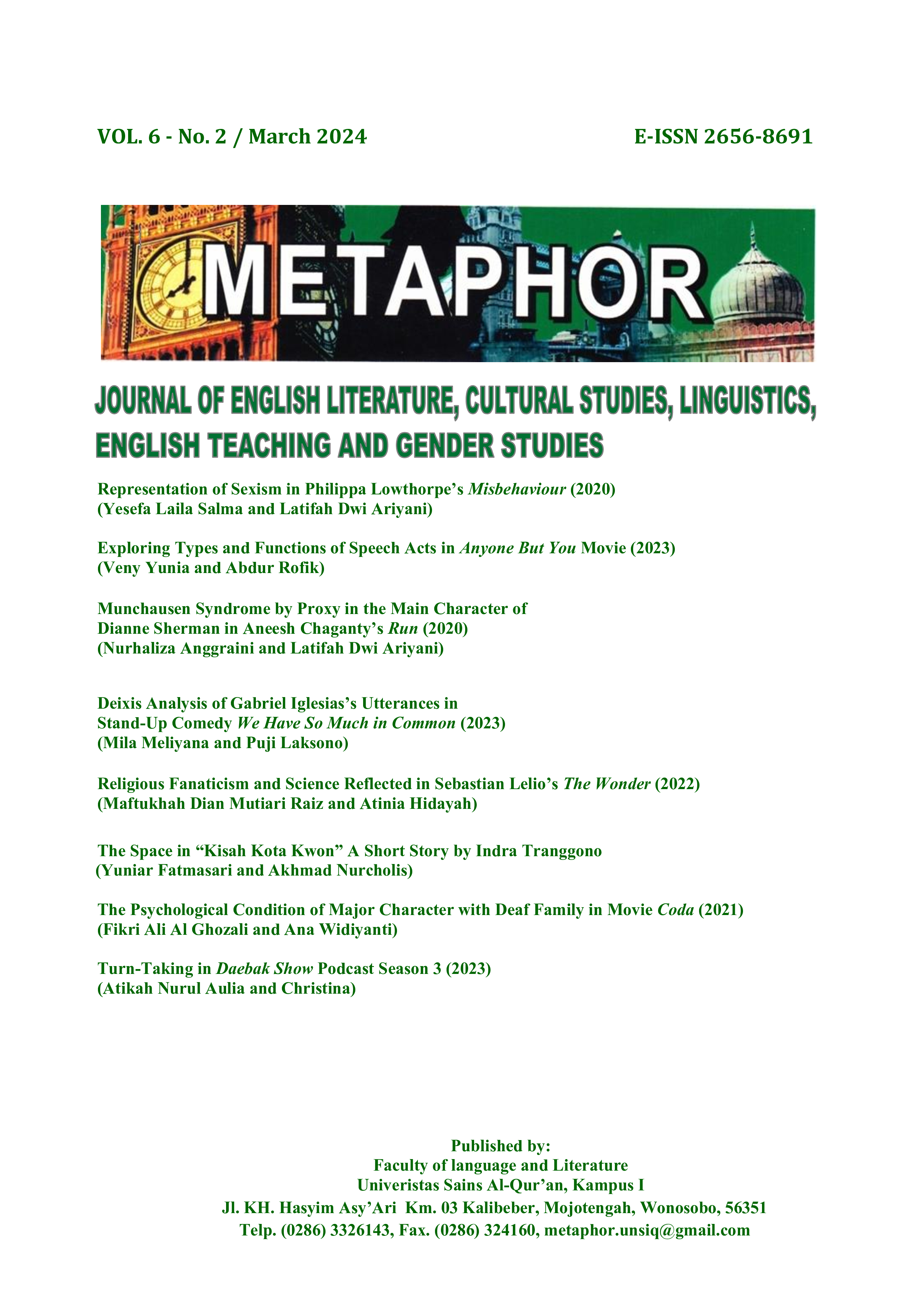Deixis Analysis of Gabriel Iglesias’s Utterances in Stand-Up Comedy We Have So Much in Common (2023)
Keywords:
pragmatic, deixis, Stand-up ComedyAbstract
Deixis is discussed in this study. The Greek word for "pointing by language" is this one. Deixis existed in written or spoken language. For learners or English speakers to grasp, these items are crucial. The purpose of this study was to identify the many forms of deixis and their references in Gabriel's stand-up comedy We Have So Much in Common. In examining the information, the author applies George Yule's idea. The descriptive design of this study was implemented through the use of qualitative techniques and numerical data conversion. The movie was downloaded from Gabriel's YouTube channel in order to collect the statistics. Subsequently, the data is examined by watching the comedy show, writing down the subtitles, and categorizing the statements that contain deixis. The study's conclusions demonstrated that Gabriel used three different forms of deixis in his speech: person deixis, which appeared 674 times, spatial deixis, which occurred 254 times, and temporal deixis, which appeared 62 times. The kind of deixis most frequently encountered in person deixis. The use of personal deixis indicated the participant in this comedy show. While the spatial deixis indicated the location and place of the event from the participant. Moreover, the temporal deixis specifies the time of speech events which is used in this comedy act.
References
Cruse, Alan. 2006. A Glossary of Semantics and Pragmatics. Edinburgh: Edinburgh University Press.
Glick, J. 2007. Some performative techniques of stand-up comedy: An exercise in the textuality of temporalization. Language & Communication. 27, 291–306.
Griffiths, Patrick. 2006. An Introduction to English Semantics and Pragmatics. British: Edinburgh University Press Ltd.
Huang, Y. 2017. The Oxford Handbook of Pragmatics. Oxford: Oxford University Press.
Leech, G. 1983. Principles of Pragmatics. London: Routledge.
Leedy, P. D., & Ormrod, J. E. 2001. Practical Research. California: Merrill Prentice Hall.
Levinson, Stephen C. 1983. Pragmatics. Cambridge, England: Cambridge University.
Lyons, John. 1977. Semantics. Vol II. New York: Cambridge University Press.
Meriam, Sharan B. 2009. Qualitative Research: A Guide to Design and Implementation. Sans Fransico: Jossey-Bass.
Miles, M. B., & Huberman, A. M. 1994. Qualitative data analysis: An expanded sourcebook (2nd ed.). Sage Publications, Inc.
Mintz, L. E. 1985. Standup comedy as Social and Cultural Mediation. American Quarterly. Baltimore: Johns Hopkins University Press.
Moleong, Lexy J. 2007. Metodologi Penelitian Kualitatif. Bandung: Remaja Rosdakarya.
Rebong, N., and Nurma Dhona Handayani. 2023. Deixis Analysis Found In “Bird Box” Movie. Journal of Language Teaching and Learning, Linguistic and Literature, 696-691.
Schwarz, Jeannine. 2010. Linguistic aspects of verbal humor in stand-up comedy. Dissertation, der Philosophischen Fakultäten der Universität dessaarlandes Vorgelegt Von.
Yamazaki, T.M. 2010. Conversational Implicature in Stand-up Comedies. Tokyo: Hosei University Tama Ronshu Fukushu Committee.
Yule, George. 1996. Pragmatics. New York: Oxford University Press.
https://www.studysmarter.co.uk/explanations/english/pragmatics/deixis/. Accessed on 6th March 2024 at 07:32



